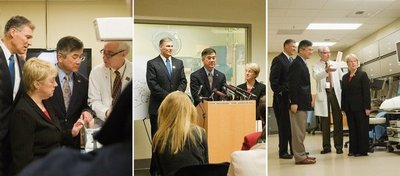March 4, 2010
Washington policymakers tour ISIS, announce broadband funding
Monday, March 1, was a busy day for the staff at UW Medicine’s ISIS (Institute for Simulation and Interprofessional Studies).
Commerce Secretary Gary Locke, Sen. Patty Murray and Rep. Jay Inslee toured the surgical skills training center located in the Surgery Pavilion at UW Medical Center. At a press conference held there they publicly announced an $84 million federal investment in building new broadband lines in Washington state.
Murray, Inslee and Locke said the funding creates more jobs and helps bring Washington in line with others in terms of technological infrastructure. It will also help to provide improved Internet access for libraries, rural hospitals, businesses and homeowners. “Small investments in small communities help them get back on their feet,” said Murray.
In a nod to the recent Olympics, Inslee said with a smile that the $84 million infusion is “a gold medal” for team Washington. “We are in an economic competition,” he said. The broadband network will also serve as “an economic tool for software developers, engineers and entrepreneurs,” he added. “It’s a common sense investment akin to development of the federal interstate highways.”
Inslee described UW physicians who provide skills training from ISIS using new technologies. Dr. Brian Ross, UW professor of anesthesiology and ISIS executive director, demonstrated use of the Microsoft Xbox in communicating with physicians in Boise, Idaho, and elsewhere within the WWAMI region. (WWAMI stands for Washington, Wyoming, Alaska, Montana and Idaho, the states that partner with UW Medicine in medical education.)
The Xbox is designed for use with video games and includes a screen shot of the player’s face. ISIS trainers have employed the Xbox as a low-cost video chat tool, and are in the early stages of expanding this type of training on a global scale. Dr. Brant Oelschlager, UW associate professor of surgery, recently delivered an Xbox to counterparts in Ethiopia.
Broadband funding described above will go to the Northwest Open Access Network (NoaNet), a nonprofit corporation of public utility districts. Partners in the project include Pacific Northwest Gigapop, Inland Northwest Health Services and the Association of Washington Public Hospital Districts, among others.



